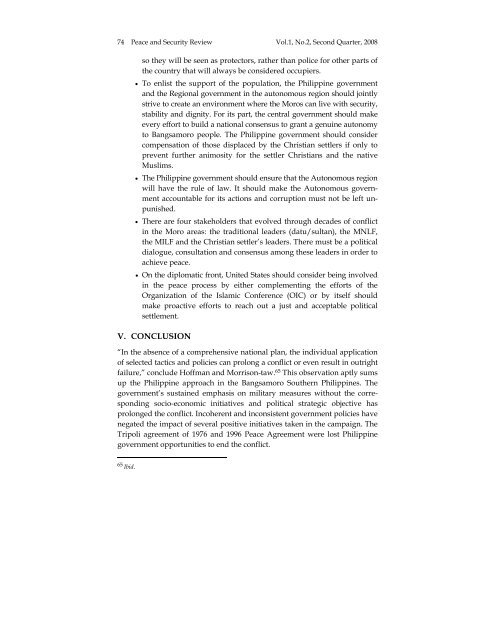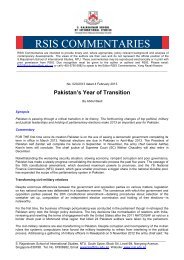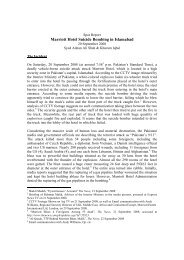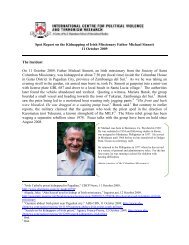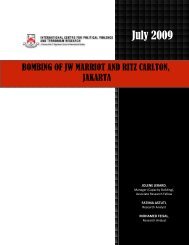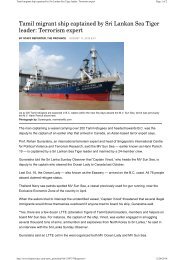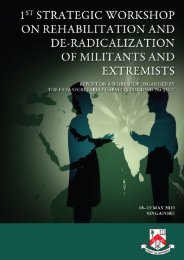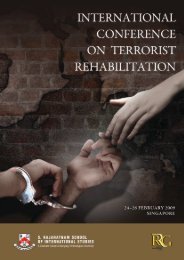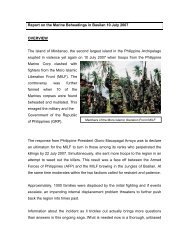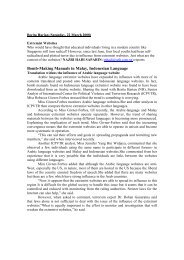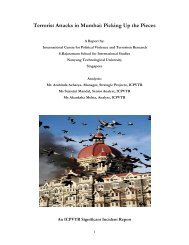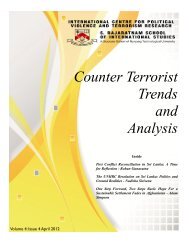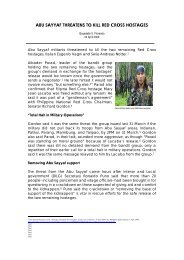Peace and Security Review, Vol.1 No. 2 - International Centre for ...
Peace and Security Review, Vol.1 No. 2 - International Centre for ...
Peace and Security Review, Vol.1 No. 2 - International Centre for ...
You also want an ePaper? Increase the reach of your titles
YUMPU automatically turns print PDFs into web optimized ePapers that Google loves.
74 <strong>Peace</strong> <strong>and</strong> <strong>Security</strong> <strong>Review</strong> <strong>Vol.1</strong>, <strong>No</strong>.2, Second Quarter, 2008<br />
so they will be seen as protectors, rather than police <strong>for</strong> other parts of<br />
the country that will always be considered occupiers.<br />
• To enlist the support of the population, the Philippine government<br />
<strong>and</strong> the Regional government in the autonomous region should jointly<br />
strive to create an environment where the Moros can live with security,<br />
stability <strong>and</strong> dignity. For its part, the central government should make<br />
every ef<strong>for</strong>t to build a national consensus to grant a genuine autonomy<br />
to Bangsamoro people. The Philippine government should consider<br />
compensation of those displaced by the Christian settlers if only to<br />
prevent further animosity <strong>for</strong> the settler Christians <strong>and</strong> the native<br />
Muslims.<br />
• The Philippine government should ensure that the Autonomous region<br />
will have the rule of law. It should make the Autonomous government<br />
accountable <strong>for</strong> its actions <strong>and</strong> corruption must not be left unpunished.<br />
• There are four stakeholders that evolved through decades of conflict<br />
in the Moro areas: the traditional leaders (datu/sultan), the MNLF,<br />
the MILF <strong>and</strong> the Christian settler’s leaders. There must be a political<br />
dialogue, consultation <strong>and</strong> consensus among these leaders in order to<br />
achieve peace.<br />
• On the diplomatic front, United States should consider being involved<br />
in the peace process by either complementing the ef<strong>for</strong>ts of the<br />
Organization of the Islamic Conference (OIC) or by itself should<br />
make proactive ef<strong>for</strong>ts to reach out a just <strong>and</strong> acceptable political<br />
settlement.<br />
V. CONCLUSION<br />
“In the absence of a comprehensive national plan, the individual application<br />
of selected tactics <strong>and</strong> policies can prolong a conflict or even result in outright<br />
failure,” conclude Hoffman <strong>and</strong> Morrison-taw. 65 This observation aptly sums<br />
up the Philippine approach in the Bangsamoro Southern Philippines. The<br />
government’s sustained emphasis on military measures without the corresponding<br />
socio-economic initiatives <strong>and</strong> political strategic objective has<br />
prolonged the conflict. Incoherent <strong>and</strong> inconsistent government policies have<br />
negated the impact of several positive initiatives taken in the campaign. The<br />
Tripoli agreement of 1976 <strong>and</strong> 1996 <strong>Peace</strong> Agreement were lost Philippine<br />
government opportunities to end the conflict.<br />
65 Ibid.<br />
<strong>Vol.1</strong>, <strong>No</strong>.2 2008 pp.49-76


